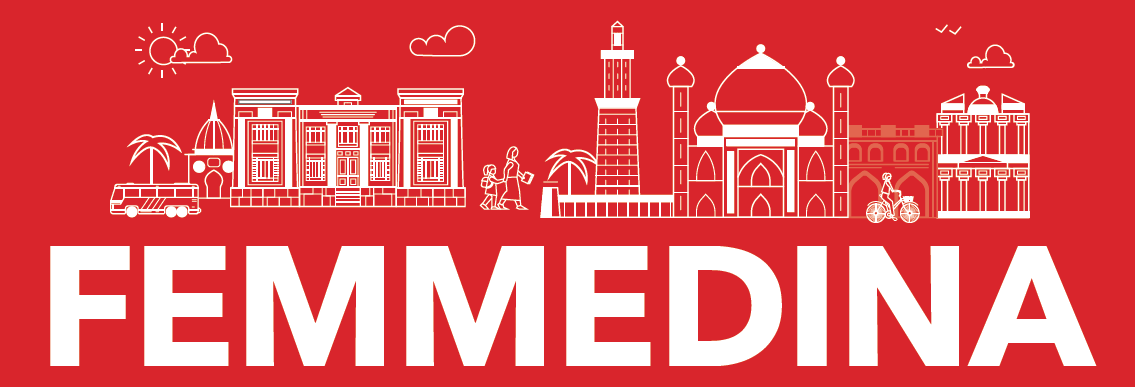In the Middle East and North Africa region, Tunisia is one of the most progressive countries with regards to women’s rights, having mobilized efforts to achieve gender equality since its independence in 1956. However, more than 60 years later, the country still has a long way to go to achieve gender equality. Patriarchal norms and constraints to broader political participation hinder the implementation of laws and regulations aimed at protecting women’s rights, exacerbating inequality by introducing additional obstacles for women’s effective participation in communal life.
Cities Alliance is implementing Femmedina, a gender-focused project that aims to rehabilitate and activate the public spaces in the historic centre of Tunisian cities, the Medina, through a broader process of women’s participation.
The project is called Femmedina, a combination of the terms “femmes (women)" and “medina” (historical city), because cities have a key role to play in promoting gender equality and empowering women and girls. Public spaces can bring together communities and facilitate cultural expression and diversity, so it is important to look at how public spaces can promote women-city relationship building.
A full participatory process in the Tunisian Medinas is the nucleus from which to engage women. It also helps identify key public spaces for small-scale physical interventions to improve women’s empowerment and safety in public spaces. Throughout the process, women residents and city leaders will improve their ability to make collective decisions on how to create a better quality of life.
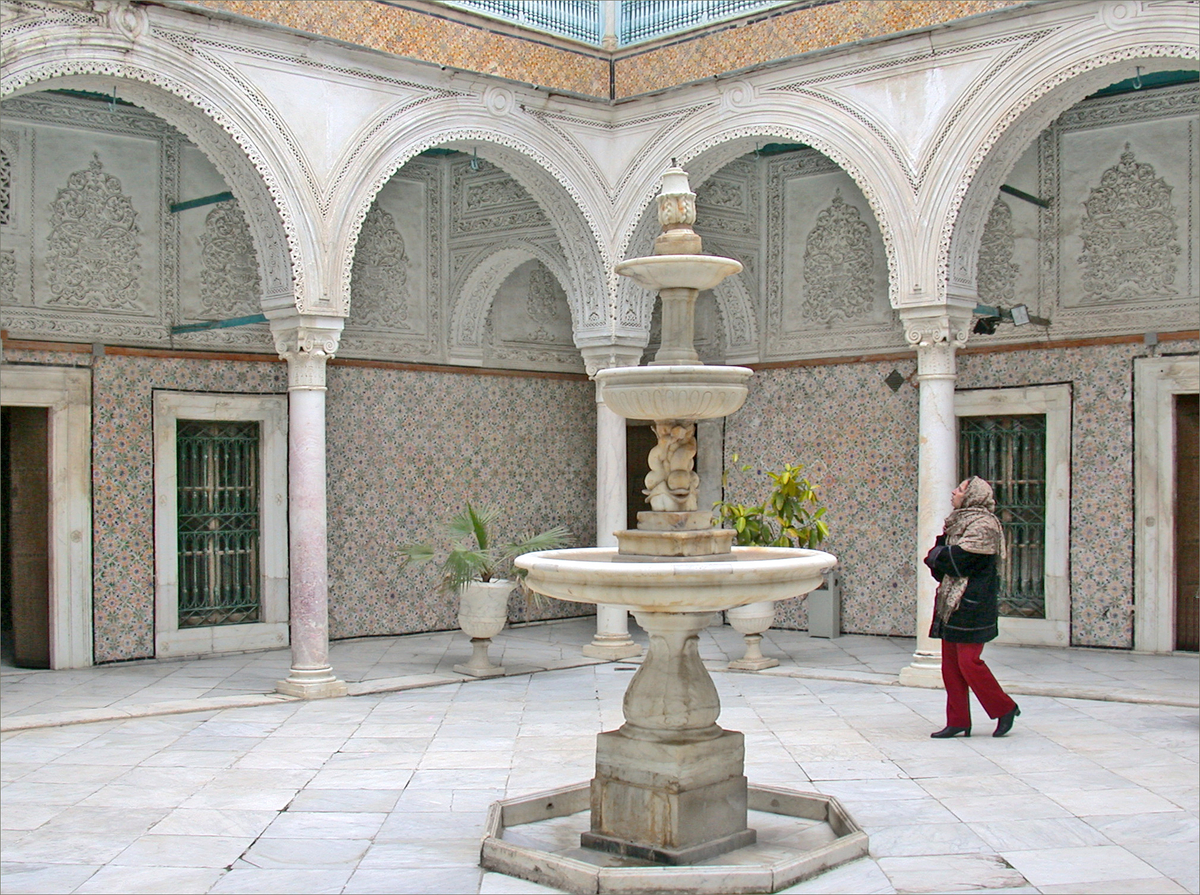
Femmedina components:
The Femmedina project comprises three phases that reinforce each other. It begins with gathering information and data, then implementing the information gathered, and finally sharing the knowledge from the project.
Phase 1: A participatory assessment. During the first phase, local experts and citizens living in the vicinity of the Medina were being engaged to identify the sorts of interventions necessary to improve the public space for women’s participation. Vital information and data were being collected through interviews, workshops, and surveys, which helped to identify potential locations suitable for interventions and transformation.
Phase 2: The creation of inclusive public space projects in the Medina. This phase tests an innovative and comprehensive approach for planning, implementing, and managing safe and inclusive public spaces in Medinas. The municipalities lead the physical interventions taking place. Identified changes may include improvements in, for example, lighting or seating in public spaces or the rehabilitation of used public buildings. The specific uses and facilities of the space will be defined through a participatory process, and local labour and local artists will undertake the technical coordination of public space projects.
Phase 3: A city-to-city exchange to share the approach and results with other Tunisian cities. Practices developed and implemented successfully are showcased across the country through online or offline learning events. This will multiply the impact of the Femmedina project across Tunisia and facilitate peer-to-peer exchange and networking amongst Tunisian cities.
Overview
In the Medina of Tunis — the historical district of the capital of Tunisia — women’s ability to actively participate in the day-to-day urban life of the community is hindered by restrictions on their ability to move freely through urban spaces. This restricted movement has a cascading effect on other aspects of their life, including hurdles to their safety and mobility broadly, and economic struggles. The Medina’s urban design and layout is mostly suitable for pedestrian access, with residents commuting and performing most of their daily activities by foot. Women report that streets are unsafe in the evening, and during weekends and holidays when the streets are empty and poorly lit. Women are often subjected to sexual harassment and theft when walking in the Medina.
To empower women as participants in and architects of the Medina’s rehabilitated public spaces, Cities Alliance and the Municipality of Tunis with the support of USAID implemented an 18-month Femmedina pilot project between December 2020 and May 2022.
October 2022 Newsletter (French only)
Click here to read the Femmedina Newsletter.
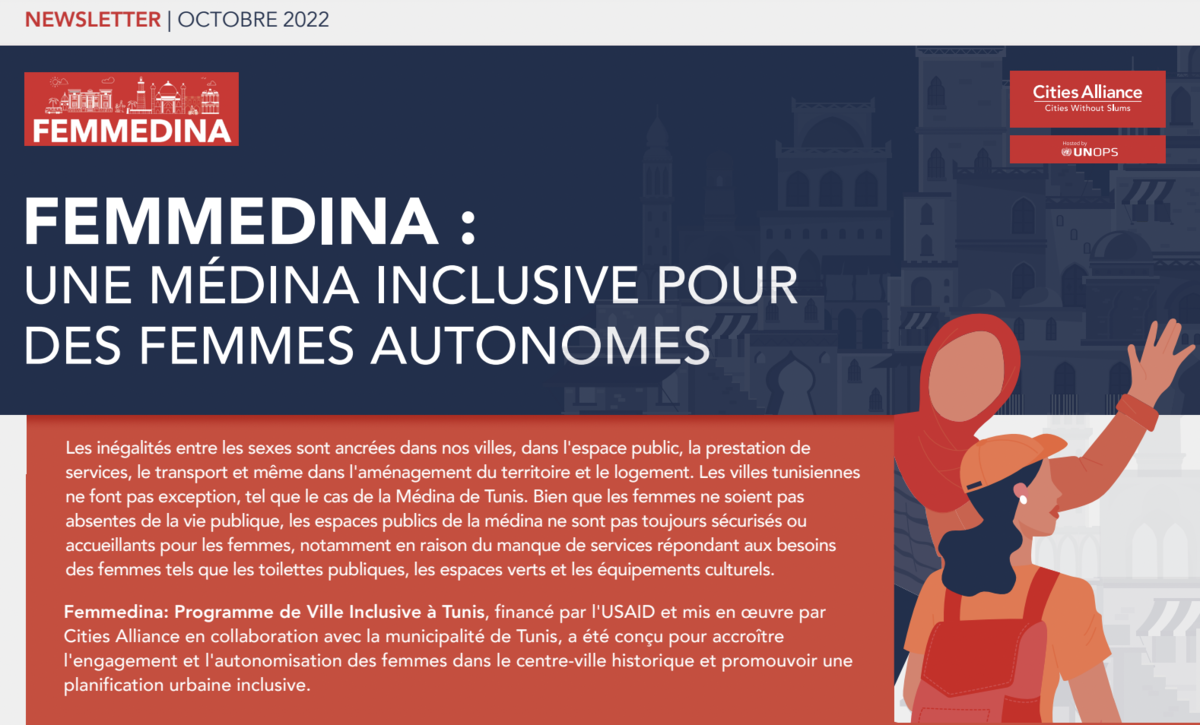
Key Outcomes and Lessons Learned - Rapid Learning Appraisal
More than 150 women and men engaged in a gender assessment of the Medina of Tunis, more than a dozen civil servants trained in inclusive urban governance, seven public space interventions that contribute to a gender-sensitive Medina where women can realize their economic, cultural and social opportunities. Read now the Rapid Learning Appraisal to learn more about the key outcomes, learnings and success stories of Femmedina in Tunis.
Watch this video to see how Femmedina contributed to public spaces that are responsive to the needs of women and promote their economic and social empowerment in the Medina of Tunis.
Municipal Exchange Event : Femmedina brings Tunisian Municipalities around the table to discuss priorities for gender-sensitive cities
On May 23, representatives of the municipalities, civil society and elected councils of M'Saken, Mahdia, Tunis, Sousse, of the "Association de Sauvegarde de la Médina de Tunis" and a former Professor on History and Gender came together to reflect on the political and programmatic priorities to ensure cities that are working for women and girls. Improved street lighting and increased opportunities for commercial activities are among the top sectors where action is now requested.
Read the summary of the event here.
Inauguration of rehabilitated, inclusive public spaces
Press conference and opening ceremony on the 9th of March 2022 - more information on the programme can be found here.
Mayor of Tunis Souad Abderrahim, Chargée d'Affaires at the U.S. mission Natasha Francheschi and Cities for Women programme lead Giulia Maci will officially open two public spaces which contribute to Tunis' transformation to a more inclusive, safe and livable city.
A recap of the event can be found here.
Launch event of the participatory assessment report
Event on the 1st of October 2021: Inclusive Public Spaces in the Medina of Tunis
How can spatial justice be strengthened to build egalitarian cities for all? How can women's participation contribute to more inclusive and safe public spaces?
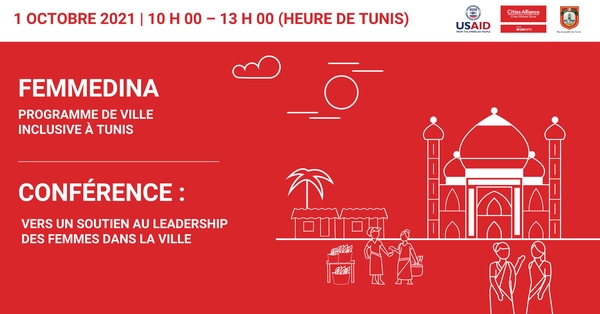
Read this Tunisian newspaper article about the launch of the report and watch this video taken at the launch event, highlighting the important role that women play and need to continue to play in reviving the Medina.
Testimonies of women living in the Medina
"A women’s place: Voices of women from the Medina" is a two-part series of testimonies from Tunisian women and their approach to the Medina (old Town) of Tunis. These stories are included in the Femmedina Magazine which is published Tunisian Arabic language.
Tunis: Voices of Women from the Medina. Part 1 and Part 2
Videos: The voices of women living, working and studying in the Medina are also captured in four short videos. Video 1, Video 2, Video 3 and Video 4
Report: Participatory assessment - Women's Participation in the Medina of Tunis
As part of the programme’s first phase, a report has been published which presents the results of a participatory evaluation of women’s social, cultural, economic, political, and institutional participation in the Medina of Tunis, particularly in the districts of Medina Centrale, Bab Souika, Bab Bhar, and Sidi el Bechir.

Workshop: Women’s Participation Assessment in the Medina of Tunis
As part of the project’s first phase, Cities Alliance organized in March 2021 an in-person participatory assessment workshop. The event gathered key local stakeholders to discuss in-depth the economic, politic-institutional, spatial, and civic-cultural aspects of women’s participation.
Femmedina Launch Event in December 2020
Cities for Women
Webinar: The Feminist City
Webinar: Beyond the Revolution - Women's Political and Cultural Participation in Tunisia
Tunisia: Cities Alliance Cities for Women Programme
Overview
Sousse, the third-largest city in Tunisia, is centered around its historic medina, a UNESCO World Heritage site since 1988. The Gabadji Grandi neighborhood, part of the Femmedina program funded by the Swiss Agency for Development and Cooperation, lies along the corniche, outside the medina walls. This area, rich in historical ethnic and cultural diversity, now faces significant social and economic challenges, particularly for women. Despite their active role in the local economy, women are marginalized due to persistent gender inequalities, facing unequal access to employment, education, healthcare, and political participation. Femmedina identifies key priorities for neighborhood improvement including public safety, rehabilitation of the municipal market’s degraded infrastructure, community engagement, and the strengthening of local commercial activities.
Key findings and recommendations for gender-sensitive urban planning in the neighbourhood of Gabadji Grandi
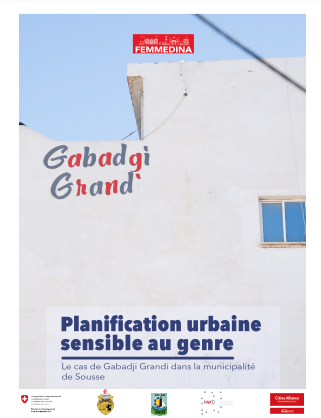
Once a cosmopolitan and thriving neighbourhood on the corniche of the medina overlooking the Mediterranean sea, in the traditional Gabadji neighbourhood, women are facing gender disparities in economic opportunities, mobility possibilities, health access, perception of safety and political participation. This city guide proposes key interventions to favor a gender-sensitive urban rehabilitation and provision of public services in the neighborhood.
Results of the Qualitative and Quantitative Analysis carried out on women's needs in the neighbourhood of Gabadji Grandi
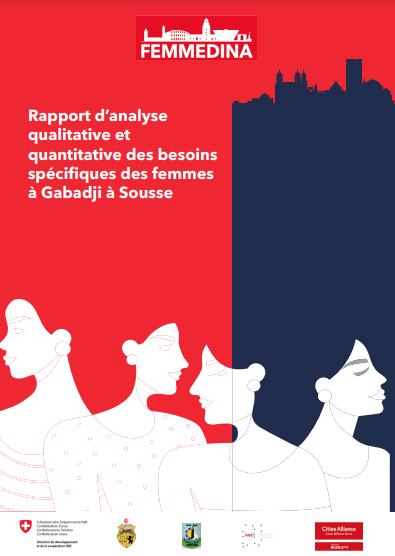
To better assess the needs of women's inhabiting the neighbourhood and empower them to be active drivers of change in the local urban development, Cities Alliance carried out a research with participative methods.
Overview
Msaken, located near Sousse, is a vibrant municipality with a rich cultural and historical heritage. The "Souk des Femmes," a pilot neighborhood for the Femmedina program funded by the Swiss Agency for Development and Cooperation, is economically and socially significant, yet women face major challenges in accessing economic opportunities and participating in public life. The area's attractiveness is hindered by poor public space management, especially in the alleys and squares near the souk. Additionally, residents highlight the need for public restrooms and initiatives to boost commercial activity as essential improvements for the urban market space.
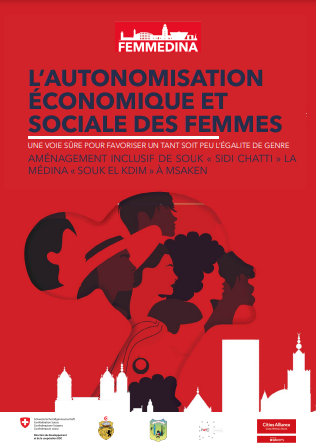
Results of the qualitative and quantitative analysis carried out on women's needs for the Women's Souk
To better assess the needs of women's inhabiting the neighbourhood and empower them to be active drivers of change in the local urban development, Cities Alliance carried out a research with participative methods. Read more about the key results and the analysis here in French.
Key findings and recommendations for gender-sensitive urban planning in Sidi Chatti and El Kadim Souks
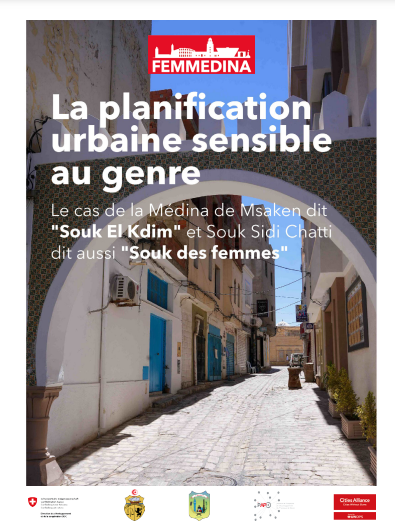
Almost only used by and for women, the "Women's Souk" in M'saken Medina is a unique place where women feel safe to socialise and sell their products. Read more about our key recommendations here in French.
Overview
Mahdia, a coastal city with a rich historical heritage, hosts the Femmedina pilot project "Le Jardin des Arts" in the Borj Erras neighborhood funded by the Swiss Agency for Development and Cooperation. A project survey showed that residents want better public spaces in Medina to involve women in both work and play, ensure safety, and attract visitors with good lighting and clear signs. Adding traditional or artistic elements and more greenery will make the area more welcoming and provide pleasant shaded spots. The project Femmedina focuses on improving women's access to public spaces, securing these areas, and increasing their involvement in local management, while respecting and valuing Mahdia's unique natural heritage.
Results of the qualitative and quantitative analysis carried out on women's needs for the Borj Erras neighbourhood
To better assess the needs of women's inhabiting the neighbourhood and empower them to be active drivers of change in the local urban development, Cities Alliance carried out a research with participative methods. Read more about the key results and the analysis here in French.
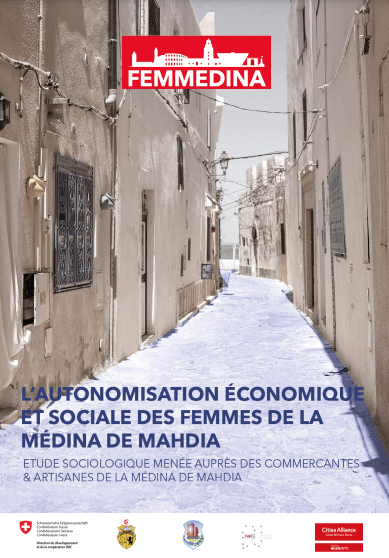
Overview
Kairouan, a historic city with rich Islamic heritage, hosts the Femmedina pilot project "Jardin Riadh Sahnoun" in the historic medina. Despite the area's cultural and social significance, women face challenges accessing community infrastructure and participating actively. A participatory evaluation revealed the specific needs of women and proposed ways to improve their quality of life.
The project in Kairouan, financed by the Swiss Agency for Development and Cooperation (SDC), aims to provide accessible green spaces and a better environment for leisure, recreation, walking, and cycling, while also reducing heat risks.
Stakeholder workshop
Read here the results of one stakeholder workshop discussing, among others, the importance of easily accessible, green, and resilient public spaces with water.
Report on Gender-sensitive and heritage-based water management in Kairouan
Read here in French the report carried by Cities Alliance and the Tunisian civil society organisation Lam Echaml on our project linking traditional majels, sustainable urban development of medinas, gender equality and water management in Kairouan.

Tunis - Key Outcomes
